
The Berlin Wall was a guarded concrete barrier that physically and ideologically divided Berlin from 1961 to 1989. Construction of the wall was commenced by the German Democratic Republic on 13 August 1961. The Wall cut off West Berlin from surrounding East Germany, including East Berlin. The barrier included guard towers placed along large concrete walls, accompanied by a wide area that contained anti-vehicle trenches, beds of nails and other defenses. The Eastern Bloc portrayed the Wall as protecting its population from fascist elements conspiring to prevent the "will of the people" from building a socialist state in East Germany.

"Ich bin ein Berliner" is a speech by United States President John F. Kennedy given on June 26, 1963, in West Berlin. It is one of the best-known speeches of the Cold War and among the most famous anti-communist speeches.

John-F.-Kennedy-Platz, formerly Rudolph-Wilde-Platz, in the Schöneberg section of Berlin is the square in front of the former city hall of West Berlin. It was here, on June 26, 1963, that US President John F. Kennedy gave his famous speech to the Berliners, in which he stated: "Ich bin ein Berliner". The square was renamed John-F.-Kennedy-Platz on 25 November 1963, three days after Kennedy's assassination, and a large plaque dedicated to Kennedy, mounted on wall next to the entrance to the city hall, was unveiled one year after Kennedy's speech.

Checkpoint Charlie was the best-known Berlin Wall crossing point between East Berlin and West Berlin during the Cold War (1947–1991), as named by the Western Allies.

"Mr. Gorbachev, tear down this wall", also known as the Berlin Wall Speech, was a speech delivered by United States President Ronald Reagan in West Berlin on June 12, 1987. Reagan called for the General Secretary of the Communist Party of the Soviet Union, Mikhail Gorbachev, to open the Berlin Wall, which had separated West and East Berlin since 1961. The name is derived from a key line in the middle of the speech: "Mr. Gorbachev, tear down this wall!"

Schöneberg is a locality of Berlin, Germany. Until Berlin's 2001 administrative reform it was a separate borough including the locality of Friedenau. Together with the former borough of Tempelhof it is now part of the new borough of Tempelhof-Schöneberg.
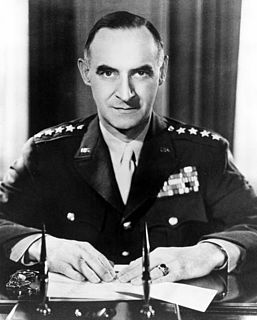
General Lucius Dubignon Clay was a senior officer of the United States Army who was known for his administration of occupied Germany after World War II. He served as the deputy to General of the Army Dwight D. Eisenhower in 1945; deputy military governor, Germany, in 1946; Commander in Chief, United States Forces in Europe and military governor of the United States Zone, Germany, from 1947 to 1949. Clay orchestrated the Berlin Airlift (1948–1949) when the USSR blockaded West Berlin.
Berliner is most often used to designate a citizen of Berlin, Germany

A Berliner is a German doughnut with no central hole, made from sweet yeast dough fried in fat or oil, with a marmalade or jam filling like a jelly doughnut, and usually icing, powdered sugar or conventional sugar on top. They are sometimes made with chocolate, champagne, pastry cream or crème patissière, mocha, or advocaat filling, or with no filling at all.

The Haus der Kulturen der Welt (HKW), in English House of the World's Cultures, in Berlin is Germany's national center for the presentation and discussion of international contemporary arts, with a special focus on non-European cultures and societies. It presents art exhibitions, theater and dance performances, concerts, author readings, films and academic conferences on Visual Art and culture. It is one of the institutions which, due to their national and international standing and the quality of their work, receive funding from the federal government as so-called "lighthouses of culture", from the Federal Minister of State for Culture and the Media as well as from the Federal Foreign Office. As a venue and collaboration partner, HKW has hosted festivals such as the transmediale, curatorial platforms, biennials such as the Berlin Documentary Forum, and mentorship programs such as Forecast. Since 2013, its interdisciplinary elaboration on the Anthropocene discourse has included conferences, exhibitions, and other artistic formats performed together with philosophers, scientists, and arstists, such as Bruno Latour and Hans Joachim Schellnhuber.
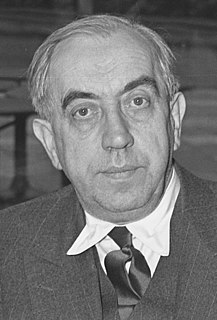
Ernst Rudolf Johannes Reuter was the mayor of West Berlin from 1948 to 1953, during the time of the Cold War.

Berlin Game is a 1983 spy novel by Len Deighton. It is the first novel in the first of three trilogies about Bernard Samson, a middle-aged and somewhat jaded intelligence officer working for the British Secret Intelligence Service (MI6). Berlin Game is part of the Game, Set and Match trilogy, being succeeded by Mexico Set and London Match, and followed by the Hook, Line and Sinker trilogy and the final Faith, Hope and Charity trilogy. Deighton's novel Winter (1987) is a prequel to the nine novels, covering the years 1900-1945 and providing the backstory to some of the characters.

The Freedom Bell in Berlin, Germany, is a bell that was given as a gift from Americans to the city of Berlin in 1950 as a symbol of anti-communism, and was inspired by the American Liberty Bell. Since 1950, the bell has been located in the Rathaus Schöneberg, the former city hall of West Berlin.

The Berlin Crisis of 1961 occurred between 4 June – 9 November 1961, and was the last major European politico-military incident of the Cold War about the occupational status of the German capital city, Berlin, and of post–World War II Germany. The Berlin Crisis started when the USSR issued an ultimatum demanding the withdrawal of all armed forces from Berlin, including the Western armed forces in West Berlin. The crisis culminated in the city's de facto partition with the East German erection of the Berlin Wall.
Barack Obama – Der schwarze Kennedy is a best-selling German-language biography of President of the United States Barack Obama by journalist Christoph von Marschall. The book was written by Marschall while he spent much of 2007 travelling with Barack Obama 2008 presidential campaign as a reporter for the Berlin newspaper Der Tagesspiegel. It covers Obama's life from his childhood, through his college years, his time as a community organizer in Chicago, Illinois, and his political career including his 2008 presidential campaign. Marschall sums up his impressions of Obama by saying, "Seine Lebensgeschichte steht für den amerikanischen Traum."
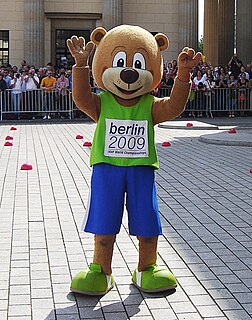
Berlino, an anthropomorphic bear, was the mascot of the 2009 World Championships in Athletics and 2018 European Athletics Championships held in Berlin, Germany, noted for his hyperactivity and celebrations with various athletes during the Championships.
Lieutenant General Sir David Peel Yates KCB CVO DSO OBE was a senior British Army officer who served in the Second World War and reached high office during the 1960s.
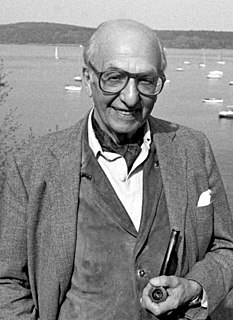
Shepard Stone was an American journalist and foundation administrator.
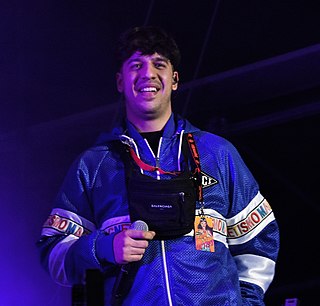
Ufuk Bayraktar, better known by his stage name Ufo361, is a Turkish-German rapper from Berlin.
Andreas W. Daum is a German-American historian who specializes in modern European and transatlantic history, as well as the history of knowledge and global exploration.
















